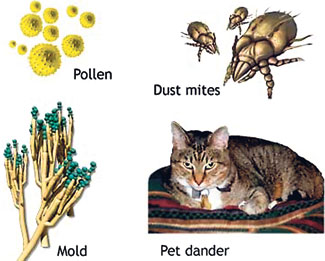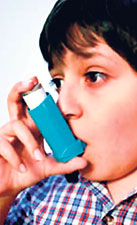If you're asthmatic, you have something in common with 1972 multi-Olympic gold medallist, swimmer Mark Spitz. Though you may never take home nine medals, the point in that comparison, is that there's nothing to keep you from living a full, energetic life, says Prof. Shyam Fernando of the Faculty of Medicine, University of Colombo. However, because there is no known cure for asthma, the key to treating it is in being consistent and careful with your medication.
Living with Asthma
Though asthma affects people of all ages, in many cases it makes its first appearance in childhood. The attacks can be terrifying, accompanied by a tightness of the chest, shortness of breath and coughing. Wheezing (the whistling sound that appears when you breathe) can heighten the sense of slow suffocation.
It echoes what is happening in your body, as the airways that feed your lungs become inflamed and consequently narrow. Swollen and sensitive, your airways are actually reacting to some substance you have breathed in.
Cells in the airways may also make more mucous than normal. Mucous - sticky and thick - further narrows the slender tubes.
Because asthma is a chronic lung disease, many asthmatics have found themselves saddled with the condition for life. Prof. Fernando emphasises the importance of seeking treatment when the symptoms first begin to appear, and then continuing with it under a doctor's supervision.
Other health conditions - such as runny nose, sinus infections, acid-reflux and stress, - can complicate treatment, and make your life harder. Your doctor will need to treat these as part of your overall asthma care plan.
Anything but an Inhaler, Doctor!
Currently, asthma is treated with two types of medicines: long-term control medicines and quick-relief medicines. Even while under treatment, sometimes mild symptoms surface, but will disappear after a dose of quick-relief medicine. Most people who take their medicines daily find they greatly reduce how severe symptoms are and how often they occur. However, sometimes the symptoms worsen or break through symptoms appear, culminating in a severe asthma attack. Such attacks, also known as flare-ups or exacerbations, are cause for concern, often demanding emergency care.
 |
| Asthma triggers |
Many asthmatics end up in the emergency room simply because of a deep reluctance to take their medication. In particular, patients are reluctant to use the inhaler, which sends the medicine straight to the lungs and will often request tablets instead.
This choice is often a poor one, says Prof. Fernando, because the dosage on tablets is necessarily higher than that taken through an inhaler. After all, the former must be digested, absorbed into the blood and circulated all over the body before a percentage of it gets to work on the lungs. The inhaler, direct and quick, is much more effective.
Patients, who fear they will get ‘addicted to inhalers’ might just have to resign themselves to being on medication for life - not because of any addiction, but simply because of the nature of the condition itself. Stopping medication without consulting your doctor is also a bad idea. Even when you feel fine, you still have the disease and it can flare up at any time, says Prof. Fernando.
Why me?
Why some people develop asthma is still something of a mystery. Researchers believe the answer lies in the interaction of environmental and genetic factors. An inherited tendency to develop allergies (atopy), is one, another is respiratory infections contracted during childhood. If asthma or atopy runs in your family, exposure to airborne allergens and irritants may make your airways more reactive to substances in the air you breathe.
 |
Viral upper respiratory infections such as colds may also aggravate your asthma.
There is a strong link between allergies and asthma - most, but not all, people who have asthma have allergies. Allergens are found in dust, animal fur, cockroaches, mould, and pollens from trees, grass, and flowers, while irritants like cigarette smoke, air pollution, dust and chemicals found at factories, in paints or cosmetics like hair sprays can also trigger an attack. Occasionally, those exposed to chemical irritants or industrial dust in the line of work will develop what is known as occupational asthma.
A popular theory, known as the "hygiene hypothesis" places the blame squarely on an increasingly westernised lifestyle which, with its emphasis on hygiene and sanitation, has resulted in an overall decline in infections in early childhood. This affects the development of immune systems in the young, increasing their risk for atopy and asthma. This is especially true for children who have close family members with one or both of these conditions.
Asthma in young children
While most children who develop asthma do so before they are five years old, they can be easily confused with an infection and as such are difficult to diagnose. Wheezing is common in infants and young children with colds and coughs, but this might be due to the fact that they have smaller airways that can narrow even further when they get a cold or respiratory infection. The airways grow as a child grows older, so wheezing no longer occurs when the child gets a cold. Watch to see if any particular allergen or irritant affects your child, says Prof. Fernando, and if you can, remove it. Aside from monitoring that carefully, he suggests parents allow kids to run and play, and even eat ice cream - in essence to not allow the disease to deprive them of a carefree, happy childhood.
Is the treatment
working?
Asthma can't be cured, so the goal of treatment is to control the disease. Yours is under control if:
- You have symptoms no more than two days a week and they don't wake you from sleep more than once or twice a month.
- You can carry out all your normal activities.
- You take quick-relief medicines no more than two days a week.
- You have no more than one asthma attack a year that requires you to take corticosteroids by mouth.
Many asthmatics are concerned that exercise will trigger an attack. Prof. Fernando says that in Sri Lanka's warm, humid climate, exercise itself is unlikely to trigger an attack. Easing into physical activity with a warm-up period also may be helpful.
If you have asthma, find out more about your illness and the medicines you take. Remember that your initial asthma treatment will depend on how severe your disease is, while follow-up treatment will depend on whether your symptoms are under control. Be aware of the triggers and try to avoid them. Take control of asthma yourself, without leaving the responsibility of controlling it to your doctor.
Learn how to take the reliever medication and when to increase your preventor inhalers. While a long spell without any flare-ups might mean you can decrease your medicine intake, do not stop medicines, without consulting your doctor.
|



